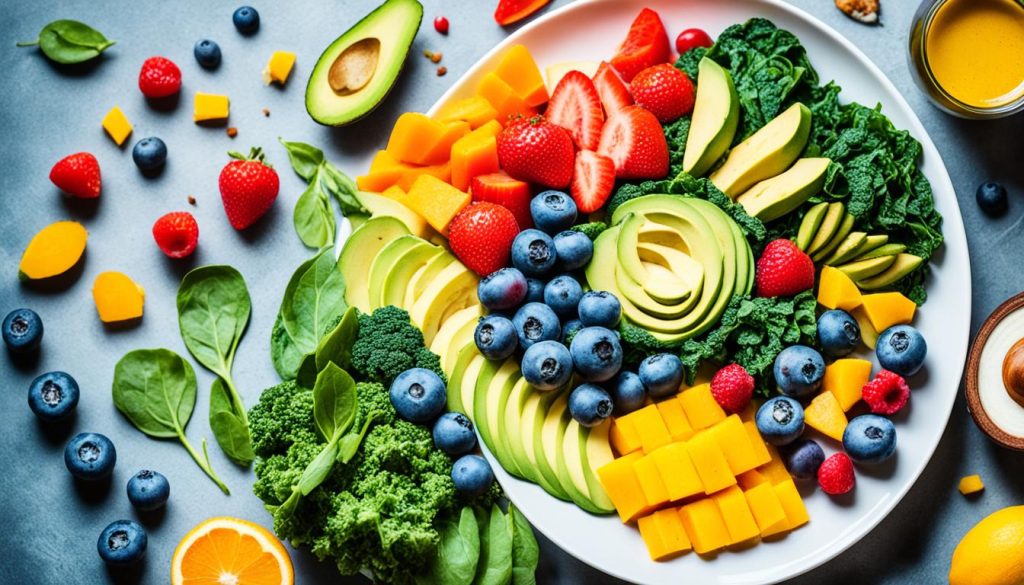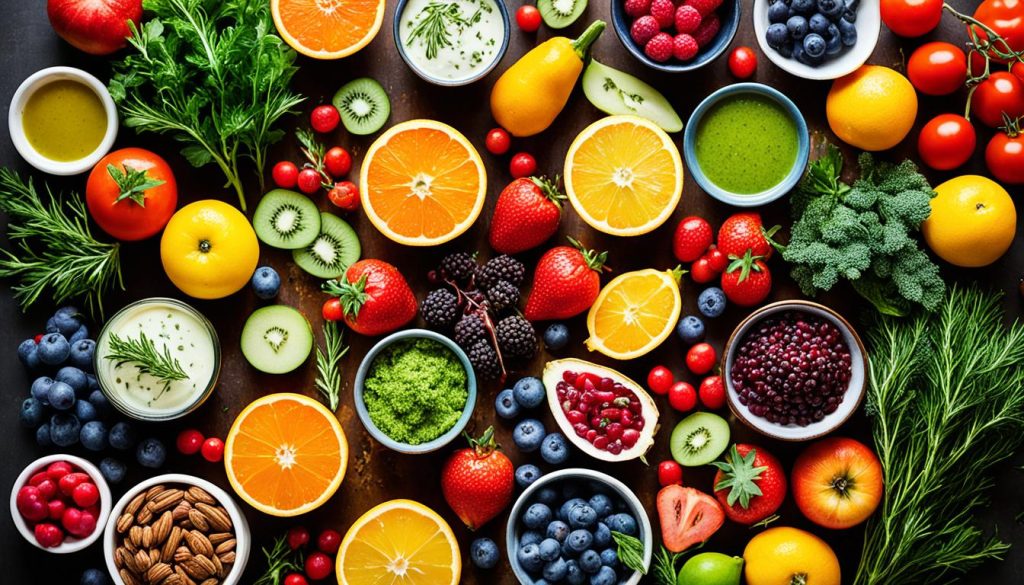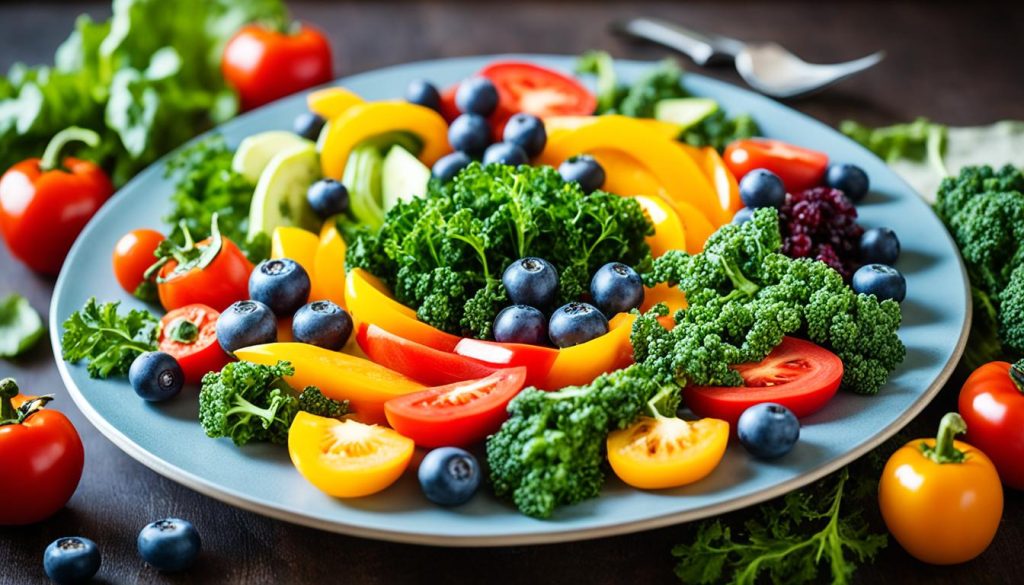As a man who spent a decade loving a woman with chronic illnesses like endometriosis and fibromyalgia, I understand firsthand the challenges and struggles that come with supporting a partner through their health journey. Sharing my wife’s experiences shaped me into the man I am today, and it sparked my love for blogging as a therapeutic outlet. Writing about our journey not only allows me to escape the new normal but also serves as a way to advocate for my ill partner and help secure our future financially.
One crucial aspect of supporting my wife’s health has been incorporating anti-inflammatory foods into her diet. Chronic inflammation can have a profound impact on overall well-being, and incorporating inflammation-fighting foods can help reduce inflammation and support the immune system. By making conscious choices and planning meals that include anti-inflammatory ingredients, we have seen positive changes in her health and quality of life.
Understanding Inflammation and Its Impact on Health
Inflammation is a natural protective response of the immune system in the body. When you experience an injury or infection, inflammation helps to initiate the healing process. However, when inflammation persists for a prolonged period, it becomes chronic and can have detrimental effects on your health.
Chronic inflammation has been linked to the development of various chronic diseases, including cardiovascular disease, diabetes, obesity, and certain types of cancer. It can also contribute to the progression of autoimmune disorders.
The immune system plays a crucial role in maintaining a balance between the protective response of inflammation and its potential harm. Inflammation is triggered by immune cells releasing chemicals and signaling molecules to the affected area, which increases blood flow and promotes the delivery of immune cells to fight off pathogens.
However, when this response persists over time, it can start to cause damage to healthy tissues and organs. Chronic low-grade inflammation can disrupt normal bodily functions and lead to a wide range of health issues.
To promote better health and reduce the risk of chronic diseases, it is crucial to understand the impact of inflammation on your body. By taking steps to reduce inflammation, you can support your immune system and improve overall well-being.

By incorporating anti-inflammatory foods into your diet and adopting a healthy lifestyle, you can help manage chronic inflammation and reduce the risk of inflammation-related chronic diseases. In the following sections, we will explore key anti-inflammatory foods and provide tips on planning festive menus that prioritize inflammation reduction.
Key Anti-Inflammatory Foods
Incorporating specific foods into your partner’s diet can play a crucial role in targeting and inhibiting pro-inflammatory pathways. One excellent example of an effective anti-inflammatory nutrition approach is the Mediterranean diet, known for its numerous health benefits.
The Mediterranean diet emphasizes whole, unprocessed foods that are rich in anti-inflammatory properties. By incorporating these foods into your partner’s diet, you can create an anti-inflammatory environment that supports overall well-being and helps reduce the risk of inflammation-related chronic diseases.
The Power of Anti-Inflammatory Foods
Here are some key anti-inflammatory foods to include in your partner’s diet:
- Berries: Packed with antioxidants, vitamins, and fiber, berries have anti-inflammatory effects that can help combat chronic inflammation. Blueberries, strawberries, raspberries, and blackberries are all great choices.
- Fatty Fish: Cold-water fish like salmon, mackerel, and sardines are rich in omega-3 fatty acids, which have potent anti-inflammatory properties. Including these fish in your partner’s diet can help reduce inflammation and promote heart health.
- Cruciferous Vegetables: Vegetables such as broccoli, Brussels sprouts, kale, and cauliflower are high in antioxidants and sulfur compounds, which have anti-inflammatory effects. Adding these vegetables to meals can provide a powerful anti-inflammatory punch.
- Turmeric: This spice contains curcumin, a potent anti-inflammatory compound. Including turmeric in your partner’s diet, such as in curries or golden milk, can provide anti-inflammatory benefits.
- Tomatoes: Rich in lycopene, a powerful antioxidant, tomatoes have been found to have anti-inflammatory effects. Incorporating tomatoes into your partner’s diet, whether in salads or cooked dishes, can help reduce inflammation.
By incorporating these anti-inflammatory foods into your partner’s diet, you can create an anti-inflammatory environment that supports their overall health and reduces the risk of inflammation-related chronic diseases.
Anti-Inflammatory Foods
| Food | Anti-Inflammatory Benefits |
|---|---|
| Berries | Rich in antioxidants and fiber |
| Fatty Fish | High in omega-3 fatty acids |
| Cruciferous Vegetables | Contain antioxidants and sulfur compounds |
| Turmeric | Contains curcumin, a potent anti-inflammatory compound |
| Tomatoes | Rich in lycopene, a powerful antioxidant |
Including these foods in your partner’s diet can help combat inflammation and promote a healthy, vibrant lifestyle.

Planning Festive Menus with Anti-Inflammatory Foods
The holiday season is a time for celebration and indulgence, often involving festive meals that may not align with your healthy eating goals. However, with some careful planning, you can create delicious and nutritious menus that incorporate anti-inflammatory foods. By prioritizing colorful vegetables and fruits, using herbs and spices, opting for healthy fats and lean proteins, choosing whole grains, and limiting added sugars, you can enjoy flavorful meals that promote anti-inflammatory benefits.
Start by filling your plate with a vibrant array of colorful vegetables and fruits. These nutritious powerhouses are packed with essential vitamins, minerals, and antioxidants that help reduce inflammation. Consider including options such as:
- Bright, leafy greens like kale, spinach, and Swiss chard
- Crunchy bell peppers in various colors
- Tomatoes bursting with flavor
- Sweet berries like blueberries, strawberries, and raspberries
Next, enhance the flavor profile of your dishes by incorporating herbs and spices. Not only do they add depth and complexity to your meals, but many herbs and spices also have their own anti-inflammatory properties. Some excellent options include:
- Turmeric, known for its active compound curcumin that has powerful anti-inflammatory effects
- Ginger, which contains gingerol, a natural anti-inflammatory substance
- Cinnamon, which may help reduce inflammation and regulate blood sugar levels
- Garlic, renowned for its immune-boosting and anti-inflammatory properties
When it comes to fats, opt for healthier alternatives like olive oil, avocados, and nuts. These sources of healthy fats not only provide satiety but also help fight inflammation. Additionally, choose lean proteins such as chicken, turkey, and fish, which are rich in omega-3 fatty acids that have anti-inflammatory benefits.
To round out your meals, include whole grains like quinoa, brown rice, and whole wheat bread. These high-fiber options not only satisfy your hunger but also contribute to a well-rounded anti-inflammatory diet.
Remember to keep added sugars to a minimum, as excessive sugar consumption can promote inflammation in the body. Instead, satisfy your sweet tooth with naturally sweet options like fresh fruit or a small piece of dark chocolate.
Incorporating these anti-inflammatory foods into your festive menus not only adds flavor and variety but also supports your overall health and well-being during the holiday season. By planning ahead and making mindful choices, you can savor delicious meals while staying on track with your anti-inflammatory diet.
Creative Recipes and Substitutions
Looking for delicious and healthy recipes to incorporate into your partner’s diet during the holiday season? We’ve got you covered! These creative recipes are not only packed with anti-inflammatory ingredients but also bursting with flavor. Give your holiday meals a nutritious twist with these mouthwatering dishes:
Herb-Roasted Salmon
Indulge in the rich flavors of herb-roasted salmon, a delectable dish that is both satisfying and anti-inflammatory. The omega-3 fatty acids found in salmon have been shown to reduce inflammation and support heart health. Pair it with a side of roasted vegetables for a complete and nutritious meal.
Quinoa-Stuffed Acorn Squash
Impress your partner with a visually stunning and wholesome dish – quinoa-stuffed acorn squash. This recipe combines protein-packed quinoa with the natural sweetness of acorn squash. Quinoa is known for its anti-inflammatory properties, while acorn squash provides essential nutrients and fiber. It’s the perfect comfort food that will leave you feeling satisfied and nourished.
Garlic Cauliflower Mash
Swap out traditional mashed potatoes for a healthier alternative – garlic cauliflower mash. Cauliflower is a versatile vegetable that is not only low in calories but also high in antioxidants and anti-inflammatory compounds. By adding some garlic for a flavorful kick, you’ll create a delicious and nutritious side dish that pairs well with any main course.
With these anti-inflammatory holiday recipes, you can enjoy the season’s festivities while nourishing your body with wholesome ingredients. Say goodbye to unhealthy indulgences and hello to delicious meals that support your partner’s well-being.

Preventative Care
Chronic inflammation is associated with various diseases, making it crucial to take proactive steps in combating it. By incorporating anti-inflammatory foods into your partner’s diet, you can help reduce inflammation and promote better health. Here are some key foods to include:
- Turmeric: This vibrant yellow spice contains curcumin, a powerful anti-inflammatory compound. Sprinkle turmeric on roasted vegetables or add it to smoothies for a tasty boost of anti-inflammatory goodness.
- Olive Oil: Rich in phenolic compounds, olive oil has been found to have anti-inflammatory effects similar to ibuprofen. Use it as a dressing or for cooking to reap its benefits.
- Green Tea: Swap your usual cup of coffee for a mug of green tea. Packed with antioxidants, green tea has been shown to have anti-inflammatory properties.
- Oily Fish: Fish like salmon, mackerel, and sardines are high in omega-3 fatty acids, which have potent anti-inflammatory effects. Aim to include oily fish in your partner’s diet at least twice a week.
- Avocado: This creamy fruit is not only delicious but also a great source of monounsaturated fats and antioxidants, which can help combat inflammation.
- Leafy Greens: Spinach, kale, and other leafy greens are packed with vitamins, minerals, and phytonutrients that can help reduce inflammation. Add them to salads, smoothies, or sautés.
- Nuts: Walnuts, almonds, and other nuts are rich in healthy fats and antioxidants that can help fight inflammation. Enjoy a handful as a snack or sprinkle them on top of salads or yogurt.
By incorporating these anti-inflammatory foods into your partner’s diet, you can proactively combat chronic inflammation and support their overall health and well-being.

Turmeric
Turmeric has long been recognized for its anti-inflammatory benefits, making it a popular ingredient in traditional medicine and culinary practices. The key compound responsible for these benefits is curcumin, which gives turmeric its vibrant yellow color.
Research has shown that curcumin has potent anti-inflammatory properties that can help reduce inflammation in the body. It works by blocking certain molecules that play a role in the inflammatory response, thereby dampening inflammation and promoting a healthier immune system.
While the science behind the specifics of how curcumin works is complex and ongoing, its anti-inflammatory benefits are well-documented. Incorporating turmeric into your partner’s diet can be a simple and tasty way to support their overall well-being.
Turmeric can be used in various culinary preparations, including savory dishes, golden milk, smoothies, and teas. Its warm and earthy flavor adds depth to recipes and provides an array of potential health benefits.
If you’re looking for inspiration, here’s a list of delicious recipes where turmeric takes center stage:
- Turmeric-spiced roasted vegetables
- Golden turmeric latte
- Curry dishes
- Turmeric-infused rice or quinoa
- Turmeric smoothies
Remember to consult with a healthcare professional before making any significant changes to your partner’s diet, especially if they have existing health conditions or are taking medications that may interact with turmeric.
Olive Oil
Incorporating olive oil into your partner’s diet can provide numerous health benefits, thanks to its anti-inflammatory properties. This versatile oil contains a phenolic compound called oleocanthal, which has been found to have an anti-inflammatory impact similar to that of ibuprofen. By using olive oil in cooking or as a dressing, you can harness its natural anti-inflammatory effects and enhance the taste of your meals.
Olive oil is a staple in the Mediterranean diet, known for its emphasis on whole foods, including plenty of fruits, vegetables, whole grains, legumes, and healthy fats. This diet has been linked to numerous health benefits, including reduced inflammation and a lower risk of chronic diseases.
Benefits of Olive Oil in an Anti-Inflammatory Diet
When it comes to reducing inflammation, the phenolic compounds in olive oil, including oleocanthal, play a crucial role. These compounds have been shown to inhibit the production of inflammatory substances in the body, helping to calm the immune response and reduce inflammation.
Incorporating olive oil into your partner’s diet can help:
- Lower the risk of inflammation-related chronic diseases, such as heart disease and certain types of cancer.
- Support brain health and cognitive function.
- Protect against oxidative stress and damage caused by free radicals.
- Improve joint health and reduce the symptoms of inflammatory conditions like arthritis.
When selecting olive oil, opt for extra virgin olive oil, as it undergoes minimal processing and retains a higher concentration of phenolic compounds. Look for high-quality brands and ensure proper storage to maintain the oil’s integrity and nutritional benefits.
| Nutritional Composition of Olive Oil (per 100g) | |
|---|---|
| Calories | 884 |
| Total Fat | 100g |
| Saturated Fat | 13.8g |
| Monounsaturated Fat | 73g |
| Polyunsaturated Fat | 10.5g |
| Phenolic Compounds | Varies depending on the quality and type of olive oil |
Pair olive oil with other anti-inflammatory ingredients, such as vegetables, fruits, nuts, and fish, to create flavorful and healthy meals. Experiment with different olive oil varieties and use it as a base for marinades, salad dressings, and sautés. Remember that moderation is key, as olive oil is calorie-dense, so it’s important to consume it as part of a balanced diet.
Green Tea
Looking for a way to boost your health and reduce inflammation? Consider swapping your afternoon cup of coffee for a refreshing mug of green tea. Not only is green tea a popular beverage, but it also holds a lot of anti-inflammatory power that can benefit your overall well-being.
Green tea is rich in antioxidants called catechins, which have been shown to have anti-inflammatory effects in the body. These catechins help to reduce inflammation and can provide numerous health benefits. By incorporating green tea into your routine, you can harness its anti-inflammatory benefits and support your body’s natural defense against inflammation.
Replacing your coffee with green tea is a simple and effective way to introduce this anti-inflammatory drink into your daily life. While coffee is a staple for many, green tea offers a healthier alternative that still provides a gentle energy boost without the jitters. Plus, green tea is typically lower in caffeine than coffee, making it a more calming choice for your afternoon pick-me-up.
So, the next time you reach for your coffee cup, why not give green tea a try? By making this small swap, you can enjoy the anti-inflammatory benefits of green tea and take a step towards supporting your overall health and well-being.
